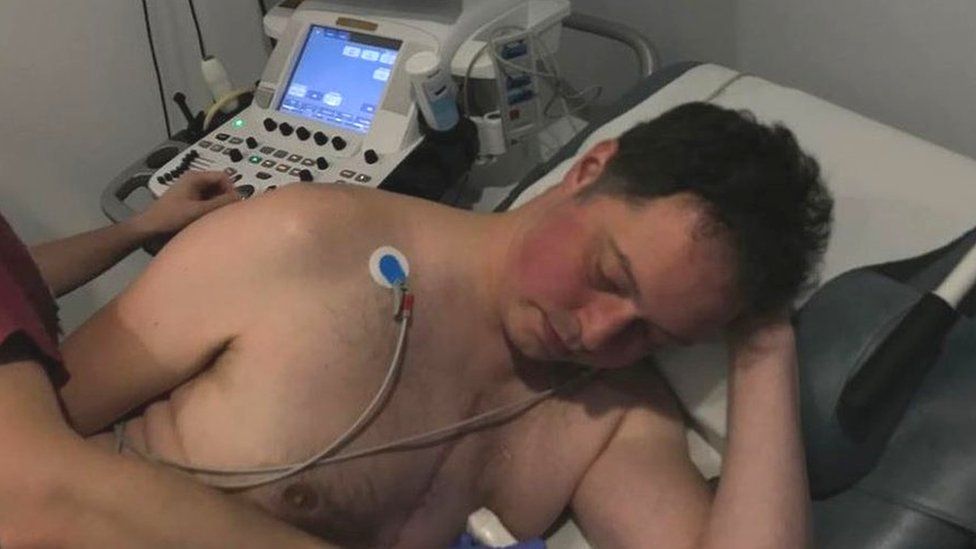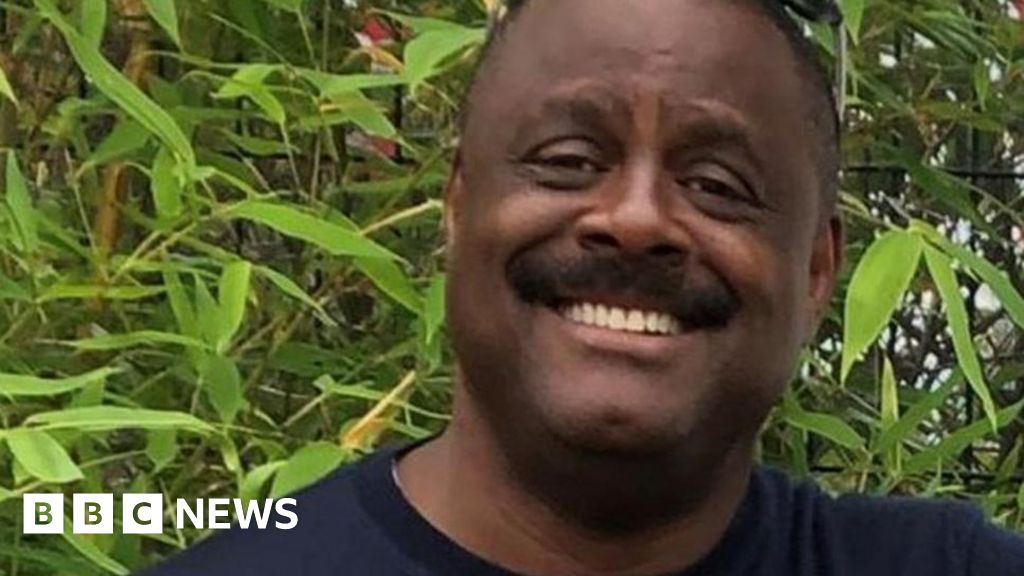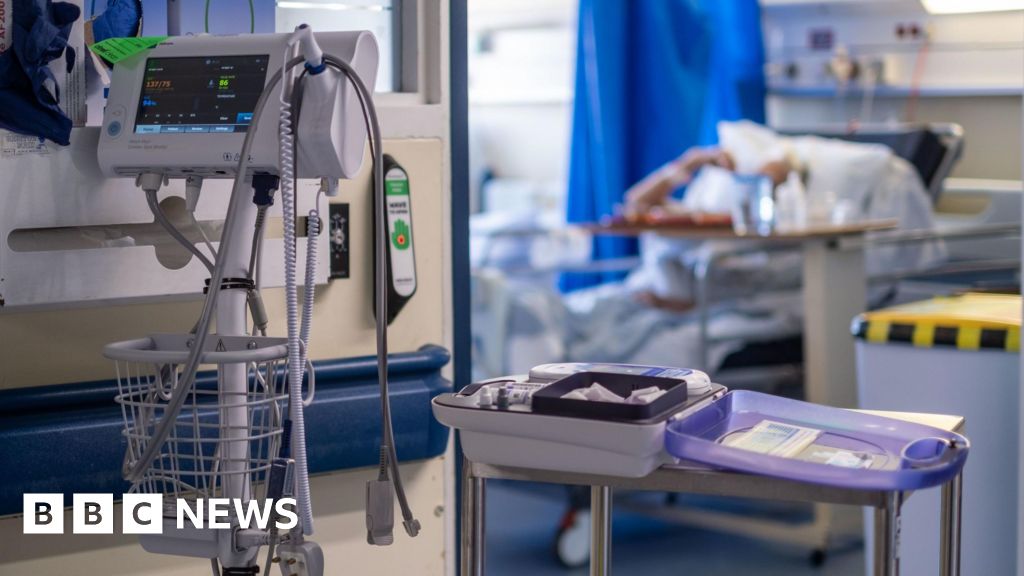ARTICLE AD BOX
 Image source, Chris Slegg
Image source, Chris Slegg
Chris Slegg recently discovered his heart was failing and that a transplant might be the only way to save his life. The BBC Sport journalist, who is from south-east London, explains how traumatic it was to receive this news and how he's become something of a pioneer by undergoing a different treatment.
Being told you may need a heart transplant is a daunting experience. It was news I received - aged 43 - just before Christmas 2021.
Due to a rare condition I was born with, my heart had deteriorated to a point where even simple tasks like unloading the dishwasher or hanging up the washing would be difficult to perform, causing pain in my arms.
My heart failure - its inability to pump blood around the body without support - was accelerating.
When a cardiologist at Guy's & St Thomas' (GSTT) in London told me my heart might only survive another year, I was left an emotional wreck. The thought that troubled me most was how it would affect my two young children if I wasn't around for much longer.
Image source, Chris Slegg
Image caption,Chris Slegg with his son and daughter
It took me a fortnight to summon the strength to tell my wife. In the meantime, every day, at some point I would find myself crying. The tears would appear spontaneously, even before I knew quite what I was thinking about.
I turned to the internet to research the topic of heart transplants. So much was written positively and well-intentioned, but I couldn't help but interpret it negatively.
"Around three-quarters of UK heart transplant patients live for at least five years," I read on the British Heart Foundation website. To me five years didn't sound like much, and what if I was to be in the 25% who didn't make it that far?
What if I couldn't even find a heart? What if I did find one but my body rejected it?
According to figures released by the NHS in March 2022, 145 adult heart transplants were carried out in the UK over the previous year and 274 UK adults are currently classed as "in need of a heart transplant".
My thoughts are with every single one of those people. And I consider myself hugely fortunate that, 16 months on from being told I might be set to join them, it is a fate I have so far avoided.
Image source, Chris Slegg
Image caption,Reporting for BBC Sport
After seeking second opinions from Bristol Heart Institute and the Mayo Clinic in the USA, my cardiologists decided to try to delay, or hopefully entirely avert, the need for a transplant by carrying out a procedure rarely performed on adults. Indeed, I've been told I'm likely to be the first adult in the world to have undergone this procedure as late as this into heart failure.
The surgery is called the Glenn procedure. When a patient is on the operating table having surgery to repair their tricuspid valve - as I did in August 2020 - the medical team decides whether they also need a Glenn.
The Glenn involves detaching the main vein in the body (the superior vena cava) from the heart and attaching it to the main artery (pulmonary artery). This sends some of the deoxygenated blood straight to the lungs, which means the right ventricle has a third less work to do because it doesn't need to pump that blood.
Some patients don't need a Glenn at the same time as the valve repair but then go on to need one. When that happens it's called a late Glenn.
It usually becomes apparent a patient needs a late Glenn within days, weeks or a few months. But I've been told no patient has had a Glenn as late as me, a full 26 months after a valve repair.
Image source, Chris Slegg
Image caption,Dr Hannah Douglas, Chris's cardiologist, works at Guy's and St Thomas' Hospital in London
"There is actually no reported evidence of literature that tells us the outcome of patients with late Glenn," Dr Hannah Douglas, a cardiologist at Guy's and St Thomas' Hospital in London, tells me. "You will be the living proof of [whether it can be effective].
"We hope to see that we have slowed down your heart failure. Your exercise ability and what you can tolerate will be critically important in assessing whether we've succeeded."
The rare condition I was born with is called Ebstein's anomaly (EA). This particular congenital heart defect (CHD) appears in about one in 200,000 live births across Europe and the US. EA varies in severity, from babies who need to be operated on at birth - and who sometimes sadly do not survive - to adults who can reach a normal life expectancy without surgical intervention.
The condition leaves the right ventricle diseased and the tricuspid valve is malformed so it leaks. Not much is known about EA. Research into cardiovascular and heart disease in the UK is underfunded compared to many other conditions.
While an estimated £29 per person is invested in cancer research every year, and half that in mental health, just £9 goes into cardiovascular disease research and development.
Image source, Chris Slegg
Image caption,The early signs regarding the Glenn procedure are positive
Furthermore, far less is known about conditions that affect the right ventricle, like EA, than the left.
"Most heart failure is connected to the left ventricle," says Dr Douglas. "Because of that the left ventricle is the one that is most studied. In cardiology the left ventricle is considered to be the glamorous one, the strong one, the sexy one. Whereas the right ventricle has been forgotten about for a long time.
"I deal with the right ventricle all day, every day in my work. I'm trying to push the agenda [regarding research] because I think we can learn more and do better."
The early signs regarding the Glenn procedure carried out on me are positive. I have noticed some improvement in my exercise tolerance. I can unload the dishwasher and hang up the washing without pain.
It is, though, impossible to say how long my Glenn can remain effective for. I have found this level of uncertainty to be hugely disconcerting. Millions of people with all sorts of conditions have to learn to live with such uncertainty and I am now among them.
Image source, Chris Slegg
Image caption,A sporting day out
I would liken the mental challenge I've been going through to a form of grief or bereavement where you are beginning to mourn the potential loss of you to your family, particularly the children, you might leave behind.
I'm incredibly grateful that my cardiologist Dr Douglas recognised the mental trauma I was suffering when I was discharged from hospital in October 2022 and that Guy's & St Thomas' now offer counselling to some cardiac patients like myself.
"My job is not possible without the support of specialised health and clinical psychologists," says Dr Douglas. "The psychological impact of having major heart surgery, of what it might mean to your quality of life or life expectancy, of what it means to your family, is huge.
"The psychological care we offer is specialised. At any time in your life, to be made aware that you were born with a heart condition and things may change as time goes on, but we don't really know when and we don't really know how, is really challenging.
"No two people with CHD are the same, certainly no two people with Ebstein's anomaly are the same."
Image source, Chris Slegg
Image caption,St Thomas' Hospital has been a familiar sight
Dr Douglas referred me to the care of GSTT's principal clinical psychologist Mina Arvanitopoulou.
I am one of hundreds of patients who have been supported by Ms Arvanitopoulou in the 16 years she has been helping adults deal with the psychological impact of heart disease.
"Many people will experience a level of uncertainty and feelings of a loss of control," says Ms Arvanitopoulou. "They become hyper-aware that life is unpredictable and that we are not invincible.
"After surgery some people feel like they are flawed. Some say they feel like they are a fraud because they have an invisible condition - one which leaves them hugely impaired physically but that no-one would know they have."
Ms Arvanitopoulou's support has helped me remain positive in the face of uncertainty. I also take strength from the fact that everything I am experiencing may help others with EA in the future.
The very late Glenn performed on me could give me many more years of life by delaying - or potentially completely removing - the need for a transplant.
And if successful, this procedure might prove to be an option for others with EA, too.
Follow BBC London on Facebook, Twitter and Instagram. Send your story ideas to hellobbclondon@bbc.co.uk

 2 years ago
59
2 years ago
59








 English (US) ·
English (US) ·